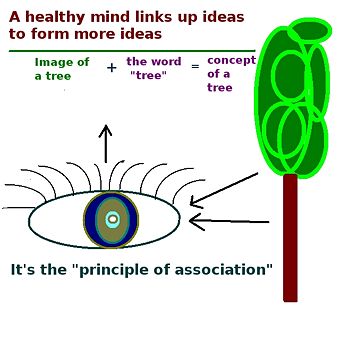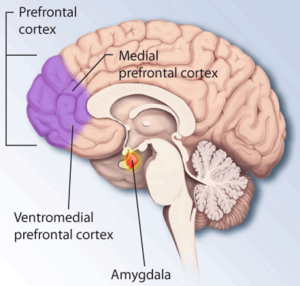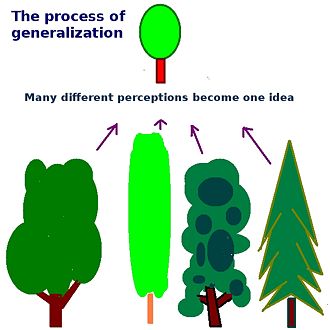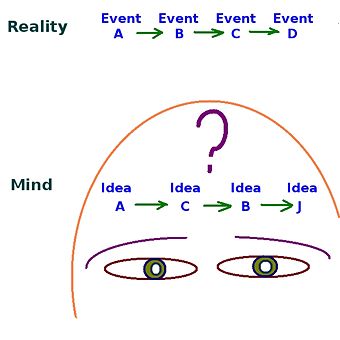Mentally healthy mind
- Further information, see Mental health
- Further information, see Mental illness
A mentally healthy mind as a subject is one way to explore the general topic of mental health. Generally, the approach by psychiatrists and psychologists is to describe behaviors viewed as unhealthy or dysfunctional or sick, but here the approach is the opposite: to try to describe a so-called mentally healthy mind to help us understand underlying assumptions and encourage further exploration. This is only one of many possible models of mental health. This particular exploration should not be construed as definitive, of course, but is only one way to encourage further exploration, and draws of necessity from disparate fields including philosophy and psychology but also theater and business and computer science and music and other areas.
So, what exactly is a healthy mind?
There are two basic senses in the Western conception: (1) a mind free from diseases and (2) an optimally well-adjusted mind. The first sense is easier to grasp, since it merely involves describing a person with the symptoms typically associated with mental illness. In contrast, this article explores the second sense of the term.
A Western conception of a mentally healthy mind is a person who functions effectively as a human being, who continues to adapt favorably to the environment, who has self-control and is alert to changes in the environment. He or she responds to change effectively by avoiding pain and finding pleasure, and finds ways to get greater resources, knowledge, power, and tools for survival. He or she has virtue. He or she has knowledge of how the world works with an awareness of what is happening around him or her. A person with a healthy mind plans actively and anticipates, usually correctly, a likely sequence of events to imagine possible actions. He or she isn't stuck in one dysfunctional behavior pattern, or imprisoned by emotions, or subject to mental illnesses such as schizophrenia or neurosis or psychosis, and a healthy mind requires physical health. Rather, he or she keeps learning and thinking and growing intellectually. A healthy mind is characterized by a capacity to change his or her behavior to fit new situations, and to change one's opinions to accommodate new information. It's marked by adjustment, re-thinking, re-evaluating premises, and leads to greater power, knowledge, and accurate perception of people and things and places. It requires intelligence and physical health. It enables freedom. It helps a person get along with others in society. It helps a person survive and thrive. This is one conception prevalent today.
But there are different senses of what constitutes a healthy mind. It depends on one's worldview. Mental health is like beauty, since it is in the eye of the beholder. We look at others and make an assessment: does person X have a healthy mind?
It's difficult for us, as individual humans, to diagnose our own mental health. The question "Am I healthy mentally" requires thinking, but if our own mind is broken––if our own thinking–process is broken––then how can we think correctly to determine if we're sane or crazy? We experience thoughts in our heads and we may think we're fine, but it's possible that we're not totally healthy. Most people probably don't think about this question at all; are they mentally healthy? Is not thinking a sign of mental health?
Still, there are ways to explore this, but it's perhaps a good idea to review a couple of key points first:
- The brain and mind are areas of biology and science that we're only beginning to understand. It is like a black box with millions of neurons organized in ways scientists don't understand, but are learning more each day.
- People judge the mental health of others. Generally, people who think like we think, who behave like we do, who have the same values we do, who behave in predictable patterns, who we think we know, and who conform to standard ways of doing things and whose opinions are in line with the dominant value system are seen as mentally healthy. We generally don't question the mental health of like–minded people, while people who we don't feel we know, who behave in unpredictable ways, who act outside our sense of what is acceptable behavior are more likely to be tagged with a label of mentally unhealthy, whether or not they are indeed mentally unhealthy.
- The label "X isn't mentally healthy" is pejorative with a negative connotation which is similar, in some respects, for a military warrior describing an opponent as a terrorist.
- There are some acts which there is strong agreement across cultures as being signs of mental illness, particularly suicide, as well as some kinds of extreme violence such as mass murder or genocide. If someone kills themself, then it's almost always viewed as mental sickness (still there are exceptions: in wartime when suicide was seen as an act of defiance; some cases of euthenasia in which decrepitude becomes unbearable.)
But to illustrate cultural differences relating to the definition of mental health, consider the misogyny of ancient Greece. Male beauty was emphasized so there were rarely statues of beautiful women. According to Classics scholar Elizabeth Vandiver, men resented the fact that women were needed for procreation, and sexual intercourse was seen as a kind of chore in this male–dominated society. Married women were supposed to remain in the home or nearby, and were not allowed to venture about in public or participate in politics or have much presence in the public sphere. In Greek mythology, there were numerous accounts of male figures giving birth, such as the god Zeus giving birth to Athena out of his head, or to Artemis out of his thigh. The prevailing custom in ancient Greece was to tolerate and condone acts in which older middle-aged men were expected to have homosexual relationships with teenaged boys, and this was considered acceptable. In contrast, from the perspective of Western culture today, adult–teenager homosexuality would be considered to be an act of criminality and possibly depravity, and persons who engaged in such behavior would be seen as mentally unhealthy and imprisoned in many societies. However, an ancient Greek such as Aristotle, examining Western societies today in Western Europe or the United States or Japan might see the movement of female rights as wrong morally, and the focus on equality and individual rights as nutty.
The point is that mental health is highly dependent on the culture one lives in. Consider different perspectives.
- Philosophy. Philosophers have struggled with issues about what makes a man or woman healthy in a mental sense, and these considerations, to varying extents, revolve around their conceptions of what the good life is and whether it can be obtained, and if so, how. The philosopher Aristotle believed there was such a thing as the good life, and thought that it was one of pursuing virtue and seeking moderation. He thought that life was best if one pursued the golden mean, and that people got into trouble when they lived at the extreme edges of life. Schopenhauer was pessimistic, and suggested that while people were fated to be foolish and that human existence was like a tragic joke, and he felt that the best that people could do would be to enjoy pleasures as much as possible, specifically the enjoyment of art, theater and particularly music. Spinoza believed that most people were subject to a form of bondage or slavery by their own emotions, but agreed that, in general terms, emotions trump reason and rationality at every turn. Nietzsche thought along similar lines, that most people were stuck in fixed patterns and didn't know how to free themselves. Psychiatrist Sigmund Freud thought that mental health required a balance between three essential parts of a person's personality, namely, the id, superego, and ego, and for him, the healthiest persons in a mental sense were those with egos strong enough to moderate the more powerful id impulses, such as basic drives like the need for sex or food or thirst, when they battled with the guilt-laden messages from the superego, like ingrained finger-wagging from an internalized sense of one's judgmental parents. The French existentialist Jean Paul Sartre thought that the world was absurd, but that it still made sense to seek out one's own destiny and strive despite the odds and inevitability of future failure to struggle regardless.
- Religion. Religions, as well, have conceptions of what a mentally healthy person is. For example, Christianity suggests a mentally healthy person is one who loves God, who accepts Jesus Christ as the savior. It's a person who is obedient to the will of God, who prays and obeys religious rules such as the Ten Commandments and the golden rule. Islam counsels faith as well, and sees a mentally healthy person as someone who is devout and believes the Koran. Buddhists think it's a person who's come to some form of acceptance about the nature of life, of the world, and has found a kind of inner peace. Hinduism, Taoism, Judaism, and other religions have differing senses of what being mentally healthy is. In contrast, atheists see healthy-minded people as persons who don't accept religion or its precepts, and who think that people are healthy only if they don't follow religion, while the believers in religion think that religious belief is the right way to approach life, generally.
- Culture. Different cultures, as well, have had different senses of the best approaches to living. The ancient Greeks believed it was knowledge of what it meant to be human, partly by contrasting human existence with that of the gods and goddesses; it meant knowing one's place in the world, realizing that as humans we have a limited and finite existence with a usually undeterminable deadline, which required humility and religious devotion including faithful performance of religious rites. It meant accepting one's fate, not trying to change one's fate, and avoiding excessive pride or what they called hubris. The ancient Romans, as well, believed during most of their Republican days, and well into the Empire, that it was necessary to follow exactly, and in the correct order, the steps necessary to perform a religious rite; one mistake necessitated that the entire ritual would have to be repeated from the start. Freud's disciple, Carl Jung, suggested that the mind forms symbolic archetypes of cultural ideals.
While there are many constantly changing perspectives on what a human mind should be like, and how it should function, it's possible to put forth a model, combining a variety of perspectives, to describe a person with a healthy outlook, mentally, from a psychological perspective with input from philosophy. Indeed, in the mental health field, it's often easier to describe mental illness, and to point out persons or diseases or disorders which are clearly unhealthy or dysfunctional, but it's much more difficult to describe a person that is seen as mentally healthy. But this exercise can be helpful in thinking, and while it's impossible to specify one exact model that all people will accept, rather, it's helpful as a way to encourage introspection to try to attempt such a model, so let's begin with politics.
A healthy mind is like a deliberative democracy
One can think of a person's mind like a kind of functioning and deliberative democracy. Imagine a small town meeting hall like in New England from the seventeenth century in America. Men [1] came together, once a year, to discuss common public matters like whether a schoolhouse should be built. At the meeting, there was an agenda of issues needing discussion, usually agreed upon in advance by officers who were elected at the previous meeting the year before whose job was to select matters of importance, and to disregard unimportant issues, so the meeting would become productive. For example, suppose the issue of building the schoolhouse was important, but road repairs weren't; they'd choose that issue to talk about, or plan to have most of the meeting focus on the schoolhouse issue. During the discussion, different people volunteered their thinking, offering information and viewpoints, but they didn't all speak at once; rather, they took turns, hopefully following the discussion and keeping to the topic at hand, so that others, using reason, could follow their thinking. And it helps immensely if people who don't know anything stay silent, hopefully listening to the people who do know things. After different views were given, and when the group believed that enough of the possible topics had been brought up, then they decided to close discussion on that topic, and vote. Sometimes this meant a decision regarding a future course of action. Hopefully, this vote would entail a choice made intelligently after weighing different possibilities, and considering the ramifications and cost-benefit analysis of various options. Then, the group would move on to another topic, deliberate, decide to close discussion, vote, and move on; when all the topics had been dealt with, and decisions reached, then ultimately the meeting would be adjourned.
Feedback is important. Ideally, the process never ends, in the sense that after a decision is made, the mind actively seeks feedback about this choice: was building a schoolhouse the right decision? Were there enough children to have made the decision sensible? Was there a better alternative available such as waiting for ten years for funding from a philanthropist or was building a tent a better option, and having classes only during the warmer months? And how important was it to educate these children anyway? What if there are no competent schoolteachers available, what then? This kind of feedback, ideally, in a mentally healthy person, keeps streaming in, being recorded and noted, and next year, at the next meeting, a hopefully wiser, more knowledgeable group of citizens meets, discusses matters again, and either amends or furthers or abandons a course of action. Habits are vital, and this takes time. So people, through experience, and by learning through trial and error, develop habits about conducting meetings, or in the example of thinking, the habits of decision making, thinking, learning. The feedback principle characterizes a healthy business as well as a healthy mind: a firm which routinely monitors its customers, ask their opinions, and tries to understand their needs operates according to a marketing orientation; accordingly, when customers needs change, it alters its products and services to meet those changing needs.
One can think of a healthy mind in the same sense as a deliberative functioning democracy in that it actively gathers real–world information about the environment, by focusing on events, making perceptions, remembering. It thinks. It weighs options. It prioritizes tasks. It allots time slots for deliberation. It deliberates within itself. It uses logic, sometimes. It imagines likely consequences to possible choices. It allows a certain amount of time for this kind of reflection, and when it's reflecting, it focuses on these decisions. And then, at a certain point, and based on the best available information it can get which understandably isn't perfect, but the best it can get––then it decides on a course of action. It acts. This course may turn out, later, to have been wise or foolish, but the important thing is that a decision was made, a choice, a path chosen out of a few possible alternatives. A healthy mind is like a deliberative democracy that meets inside itself, thinks, weighs choices, and makes decisions, hopefully that are right and helpful and that lead to increased opportunities in the future.
The important thing to realize is how difficult it is to keep this process going, since there are problems at every stage which can and do block the deliberative process. Look at a deliberative democracy. It's possible that a few disruptive and intolerant persons disrupt the meeting by shouting or yelling because they're intensely concerned about one particular issue. They're fanatical about some irrelevant topic, such as witchcraft; but it really isn't important to the group, and their thoughts aren't based on any kind of reality (assuming there aren't any witches). Well, this is a problem for a democracy. In an individual mind, the same kind of problem can occur: perhaps one particular thought or concern tries to dominate the discussion within one's mind. This can happen with an obsessive or compulsive person who thinks constantly about worrying about one less-than-important topic such as germs, for example; this thought dominates their brain to such an extent that they are unable to devote mental resources to other pressing issues. Or, suppose that in a democracy, there is a group of people attending the meeting who are literally quite stupid, ignorant of events, yet think they're knowledgeable. They decide to inject their ill-informed viewpoints at every point in the discussion. As a result, they can dumb down a meeting, perhaps by introducing extraneous or spurious facts that distract attention away from relevant facts. Or, suppose that people in the group are smart, thinking, but they just don't know some particular fact relevant to the discussion. They're ignorant, but may not know that they're ignorant; in the same sense, a person, actively trying to think about things within their own mind, may be similarly ignorant. They don't know the necessary information. They think they do. But they don't. This stuff can happen.
Here's another problem: suppose the meeting takes too long. It debates on and on and on and on. It wants to examine every fact and every possible choice in such detail and won't make any decisions until it's sure that it's perfect. This, too, is a kind of mistake, because there is no such thing as perfect information but only intelligent guesses. There are some very intelligent people who, because of their extraordinary brainpower, want to make every decision perfect, but in this deluded effort, they take so long to make every determination that they don't have enough time to actually achieve the goal. For any intellectual process to work effectively, there must be some kind of balance between time spent thinking and time spent acting. It's a matter of proportion. Too much thinking isn't good; not enough thinking isn't good either; there must be some kind of balance. There must be some oversight function in the brain which apportions time between these two tasks, and makes sure that there is sufficient time, and in the right amounts, for both tasks. It's difficult to get this balance right.
Suppose that in a democracy, the people who show up to deliberate are all blind. They can't see. They're good people, smart and responsive, but they lack a perceptual capability because of their affliction. It's not their fault. But what's problematic is if they're asked to make some decision that depends on their having seen things that they can't see. If they know that they shouldn't decide on certain areas, because of their lack of visual ability, then they can intelligently recuse themselves from such a decision, or possibly asked sighted persons for assistance in helping them decide something.
What's key in both a deliberative democracy, and a healthy functioning mind, is the continuing and ongoing process of thinking, exploration, perceiving the real world as it is, and making best-guess choices, and then following up on our choices to do a kind of self-assessment to get feedback. Humans have limited abilities. Our brains are large but finite with limited processing power. We have eyes that are better than most species of lizards, but weaker than those of eagles. Our sense of smell is lackluster compared with most dogs and polar bears. We have the potential to think rationally, logically, but it's difficult since much of our thinking relies on hunches and guesswork. We can be weakened by disease, hampered by youth and inexperience as well as the vagaries of old age. We're mortals. We're born, live, and die. We don't live forever. We're not immortal or like the so-called deathless ones like the Greek gods and goddesses from Greek mythology.
The mind as an organ of thought

The mind links ideas according to the principle of association. It allows us to combine simple thoughts and sounds into more complex ones in an ever increasing web of abstract thought.
The brain's job is to think. That's it's task. A healthy mind, then, thinks well.
Consider that our brains have to process potentially huge amounts of information. What's important? What isn't? Some mental activity involves ferreting out the distractions. The exact mechanisms of how this happens in the brain is not well understood so far, but it's important that this happens. For example, a person could be reading a book outside of a cafe in Britain such as the Panton Arms, and be thoroughly immersed in the storyline, but if somebody else calls their name, they'll perk up and pay attention; if another name is called, it most likely will not even register in their consciousness. How does this happen? How do people learn to respond to their own names and not other names? While scientists continue to explore these areas, an important part of mental health is having concurrent processes going on in the brain at the same time which allows one activity (reading) to take place with full concentration while permitting another activity (hearing one's name) to interrupt the first activity. In contrast, if a person was reading, and a friend came by and said their name, but they didn't respond but kept reading, the friend would likely conclude that something was wrong, perhaps with the person's mental health.
But the ability to concentrate marks a healthy mind. It's paying strict attention to a particular subject, following it, grasping the logic, staying on task, absorbing new information and assembling it into a coherent whole while, at the same time, permitting interruptions when important stimuli present themselves. A person who only responds to external stimuli and can't concentrate may be thought of as scatterbrained or harebrained or possibly have a mental illness such as Attention deficit disorder or A.D.D. and, as a result, will have a difficult time learning new things. At the other end, a person who can only concentrate, but misses important signals, may be described as being lost in thought, and this can be dangerous as well, particularly if the new signals suggest something requiring instant action, such as a boulder rolling down a hill and crush them. A person lost in thought could get squished. In another case, some people may be particularly good at focusing on some types of areas, such as counting, such as an idiot savant, and may have impressive skill at adding or multiplying numbers with many digits in the blink of an eye, but may lack an ability to understand the value of something like money, like the character Rainman in the movie of the same name. Rainman could count hundreds of spilled toothpicks in a few seconds, but couldn't understand the value of a dollar. This suggests, again, the wisdom of Aristotle, who thought it was best for humans to live as a means between the extremes, that is, to be able to concentrate when necessary, but to be distracted when necessary, and to shift between the two modes of thinking as required for survival, and not to live at either extreme. It suggests a kind of mental management function of the mind is vital in addition to sheer processing power, and is similar to a deliberative democracy by a meeting which can focus on particular topics in the agenda, and stay focused as necessary.
Another characteristic of mental health is the ability to craft generalizations. This means distilling complex ideas into a simple rule or fact or law, simplifying, losing much of the unnecessary complexity while boiling information down to a fraction of the size, but which still allows us to grasp things and work with knowledge. One generalization is what goes up must come down and this is a helpful simplification which applies to almost all situations (except: certain space rockets) so a person purchasing a trampoline, and jumping on it, won't worry about possibly catapulting himself or herself into deep space. Another example, a boy or girl may throw enough stones and rocks, bite a couple, try to smash it with a hammer, and then pretty much come to the generalization that all rocks are solid and hard to smash. This is a huge time-saver and benefit when it comes to dealing with a complex environment with a wide variety of shapes and things and objects; if the person becomes a teenager and sees a boulder, he or she will know, without having to try to smash it with a hammer or jump on it, that it's likely to be solid, and can use this information intelligently, perhaps to stand on the boulder to get a better view of the countryside. He or she will know that the boulder will support their weight, since they've learned from the earlier generalization to trust the solidity of rocks. Of course, generalizations are not perfect, and can lead to mistakes, since there may be some rock-like shapes in the world which aren't solid, and can lead to unpleasant surprises. But for the most part, generalizations (when they're mostly correct) are extremely helpful. They're the mental building blocks for more complex abstractions since they enable the mind to grasp a whole class of objects or problems without having to explore, individually, each one.
Generalizations, of course, are based on the idea of the principle of association which allows us to link one idea with another, assembling them into more sophisticated associations and higher level thinking. At the most basic level, we link in our heads one idea with another, letters with sounds, a word with an object, many objects with a group, basic ideas with a concept, and so on, until in our heads we have a system of interrelated ideas, somewhat akin to an online encyclopedia such as Citizendium, in which ideas (articles) are connected via wikilinks of association in a vast network which hopefully has some basis in reality. It enables a worldview. We construct our best guess about how the world works. Is it right? It's a guess, incomplete, based on partial and sometimes incorrect information, and ultimately we don't know. Hopefully our worldview is comprehensive and accurate and easy to use.
Another way to look at is to think of a healthy mind as one which can lead itself and the body in a series or sequence of goal directed behaviors. Think of driving a car from point X to point Y. The goal is point Y. To reach this goal, the mind must engage in planning the route, making specific choices along the way, paying attention to road signs as well as other drivers, allowing for unexpected developments such as bridge repairs, and accounting for weather conditions such as rainstorms or icy surfaces. It's an interactive task demanding that one pay attention to developments, and which requires a fairly intense amount of mental concentration to do successfully. If a person can drive a three thousand pound automobile past changing circumstances without causing a crash, and get to the destination in a reasonable amount of time, then the driver is thought to be mentally healthy in this context. He or she made the trip successfully.
Reaching a goal is like being able to construct one's own computer flow charts on the fly. It's writing new ones when new obstacles or opportunities present themselves, while keeping the ultimate goal in sight. It's a kind of dual consciousness: paying attention to the immediate problem, while keeping the long term goal in the back of one's mind. If an obstacle blocks the path, then we drive around it. If a shortcut emerges, we take it. It's constant re-adjustment en route. There is an assumption of a degree of mental health, and clear indications of competence in some basic areas of cranial activity.
But suppose a person drive to point Y every day for no conceivable purpose. Nobody knows why he or she makes this journey. He or she doesn't know why as well. The trip happens flawlessly, but why? And suppose, further, that there is no reason for this trip. It's totally pointless. Then, it's possible for us, examining this driver, to still conclude that the person isn't totally mentally healthy, that is, that mental health isn't merely achieving goals, but rather involves deeper issues regarding freedom, philosophy, and meaning in life.
Accordingly, a repetitive habit may or may not be seen as mentally healthy depending on some kind of assessment of its purpose, and how it fits in with a person's life. The philosopher Immanuel Kant, who wrote intelligent treatises on numerous subjects, had a habit of a daily walk which was so regular that people could "set their clocks by him" as he passed by.[2] As seen in the context of his entire life, Kant was seen, then and now, as mentally healthy, and in the context of his overall life, the daily walk doesn't appear nutty, although perhaps a bit eccentric?
The philosopher Spinoza believed that a healthy mind would form linkages between a series of ideas and an external series of events. He proposed a correspondence theory suggesting there was a one–to–one correspondence between ideas and events. Accordingly, he advocated that humans should try to form longer and longer chains of ideas, correctly understood (he used the term adequate), inside their heads, which accurately predicted reality. For example, suppose one wants to get a haircut. Suppose that's Event D (see diagram). That's the goal. To get there, one needs to get in the car (A), drive to the barbershop (B), park the car (C), and walk into the shop and request a haircut. Those are the steps. If a person has an adequate sense of these correct steps in the correct order, then he or she can be described as more mentally healthy than a person with confused thinking, perhaps who requests a haircut without driving to the store first, for example.
But suppose a person drives seemingly aimlessly to different destinations. Why? On Monday, they drive to the top of a mountain, on Tuesday to a river bend, on Wednesday to a forest, on Thursday to a windy beach, on Friday to a waterfall. The behavior may appear erratic, but maybe not: suppose they're a nature photographer taking pictures of selected locations for a future article in a magazine; in this instance, one might conclude that the person was functioning effectively and was mentally healthy. In a sense, what defines a mentally healthy mind is when a person has a hierarchy of purposes, ordered in such a way that the higher–order purposes (such as nature photography) can be realized when the lower–order purposes (eating, drinking, sleeping, shelter) are met. By accomplishing successfully the lesser needs, it's possible to achieve ambitious goals such as becoming a top nature photographer.
A theory along these lines, termed self actualization, was proposed by the psychologist Abraham Maslow in 1943 in a paper entitled A Theory of Human Motivation. Maslow suggested that people had a hierarchy of needs, and that it was necessary for the basic needs to be fulfilled first before advancing on to more sophisticated needs. Basic needs such as water, food, air, sleep had to be met before more higher-order needs were met such as security needs, social needs (love, affection), and esteem needs (see diagram). The highest needs he termed self–actualizing needs and described people who are self–aware, concerned with personal growth, less concerned with the opinions of others or the crowd, and keenly interested in fulfilling their potential. What characterized fulfilled people? He studied people that impressed him, including Albert Einstein and Eleanor Roosevelt. He characterized self-actualized people as having:
- Acceptance and Realism, with realistic perceptions of themselves, others and the world.
- Problem-centering focus on solving external problems and helping others and finding solutions. They're motivated by personal responsibility and ethics.
- Spontaneity in their thoughts and behavior, and while they can conform to social expectations, they can be open and unconventional.
- Autonomy and Solitude and can operate in independence and privacy as well as social situations.
- Continued Freshness of Appreciation so they can find joy even in simple pleasures.

Reality is like a full picture showing everything, including this tree called a Bonsai Trident Maple.
But getting this connection to reality is a difficult perceptual and conceptual task. We have to make do with incomplete information, sometimes whispered sounds, muffled voices, blurry pictures, unfinished sentences. We try to solve conceptual jigsaw puzzles with pieces missing, including the end and corner pieces. It's difficult to envision the complete picture. In diagnosing mental illness, there are a variety of terms which describe inaccurate interpretations of reality such as arbitrary inference, catastrophizing (making a mountain out of a molehill), dichotomous thinking (being unable to see a middle ground or compromise, so that a person is either a friend or foe), overgeneralization (example: a woman who says my boyfriend dumped me and therefore concludes incorrectly that no one loves me), personalization, and selective abstraction (example: a man walking by hears other people laughing, and thinks mistakenly that they're laughing at him). It's easy to make mistakes when we're tasked with photographing and processing huge amounts of information with a tiny handheld camera with limited memory capacity.
Advice from philosophers and religious thinkers
To live with an optimal state of mental health, in the view of many philosophers, is more than intelligence or correct information processing but ultimately coming to grips with metaphysical questions: why are we here? what is virtue? what is happiness? what is good? is there a God or are there gods and goddesses? While philosophers may not agree on the answers to the questions, they might agree that wrestling with these issues brings benefits in the sense of helping people get a better understanding of how to live our lives. The Greeks compared themselves with immortal or so-called deathless ones, trying to find meaning to life when it's not readily apparent. In the Iliad by Homer, the hero Achilles wrestles with the question of what life is all about. Is it about honor and glory? Or enjoying a long life? Achilles had a distinct choice between two options: glorious honour throughout all time but with a short quick life, or a long uneventful life leading to obscurity. At one point he shrugged off the entire Greek code of honor and refused to battle after being dishonored by Agamemnon. Later when his best friend Patroklos was killed in battle, the emotion of rage overcame him, and he fought bravely into the halls of everlasting fame, only to die shortly thereafter. Achilles came to regret his choice, according to Homer, who had Odysseus visit him in the underworld of Hades and hear him wish he was back among the living and walking on the green earth in the sunlight. Was Achilles mentally healthy? He achieved wonderful glory, but he died. What's the object of life?
Or was Einstein mentally healthy? The famous physicist was asked at one point to become prime minister to the state of Israel, but he declined, saying that he lacked an ability to deal with so-called people problems. Socrates might have applauded such a decision; he suggested the prime virtue was to know thyself, and if Einstein knew that he wouldn't succeed in politics, then he made the right choice. Spinoza suggested it was up to individuals to determine what was meaningful in life, and that virtue was its own reward, and that it was good for people to pursue what was good for them, and good meaning what's useful to us (a thing or person or activity or place) which helps us affect or be affected in ways that are helpful to us. Nietzsche, who read Spinoza and who was a forerunner of later existentialists, would equate mental health with a will to power, and that mastery over one's environment was a clear sign of mental health.
One can examine mental health from any of the three major philosophical approaches––love, understanding, and power––and still be left with more questions and a seemingly never-ending search for meaning. If one sees the mentally healthy person as a person who can love (a perspective by many religious leaders including Christ), what then? Is a mentally healthy person someone who understands (from the perspective of rationalist philosophers including Descartes), then what? Or a person with power (such as Nietzsche). Or some mixture of the three? Regardless, questions remain. It's up to us, as humans, to try to determine what life is all about, and there will never be a definitive answer to these questions that satisfies everybody.
Existentialist philosophers such as Jean-Paul Sartre in his book On Being and Nothingness (and depicted in his story Les Jeux Sont Faites) who argued that humans are "condemned to be free" and that we create our own purpose by taking responsibility for our life and total control over our actions. It's not good to succumb to existentialist abstractions such as despair, angst, absurdity, alienation, isolation, meaningless, or boredom. Mental health is marked by not being overcome by these obstacles, and facing death straight in the face and going about one's life regardless. Freedom requires that we're accountable for our actions, according to Sartre. But the philosopher seen as one of the original existentialists, Søren Kierkegaard, believed intensely in Christianity while other existentialists such as Nietzsche and Sartre did not, they agreed about the need to make free choices.

Actor Dana Delany has imagined herself as a nurse, as a womens' rights activist and dozens of other roles. Some psychologists speculate that the disciplnie of role-playing helps a person have better mental health and develop empathy and compassion.
Even discipline from such activities as acting can have positive consequences, according to some theorists. By role-playing, we get to walk temporarily in somebody else's shoes, to try to see the world from an entirely different perspective, and develop empathy. It's no accident that many of the best actors and actresses around the world often have great empathy and compassion, since their job requires them to gain new perspectives and to try to see things through the eyes of an imagined person. Some therapists encourage their patients to engage in role-playing and theater-type exercises to encourage this empathy and understanding.
If there is some agreement from philosophy about mental health, perhaps it may be in the area about not becoming a prisoner to the emotions. This was central to thinkers such as Spinoza who saw humans as prisoners of the emotions, like a form of slavery or bondage, which trumped the power of reason in most circumstances and kept people from rising to their highest potential. Spinoza figured that if one wanted to triumph over the emotions, then it was necessary to try to understand them, and to realize and accept that all events as well as ideas are determined, and with this acceptance, to try to get a handle over fate by seeing how things couldn't happen otherwise. A mentally healthy act for a philosopher such as Spinoza is: shrugging one's shoulders. It happened. Stuff happens. We shouldn't get too frazzled about it. If we look at the world from the perspective of an infinite Being such as God or Nature (Spinoza equated the two, although this is somewhat of an oversimplification), then from the perspective of God or Nature, everything is determined, fated, caused by necessity to happen in a predetermined way, and there's nothing we as humans can do about it, according to this view. Ancient Greeks looked at destiny as if it was the will of Zeus that things would happen in a certain way. Therefore, forgiveness of oneself and others isn't merely a smart moral practice, rather, it's logically the smart thing to do. But as humans, Spinoza argued, it's possible for us to get a greater share of the determining by trying to understand the cause-and-effect relations between things and between ideas, by extending longer and longer chains of causation to help us get a better handle over our environment, to live better, to have more money and status and wealth and success with healthy relationships, to be healthier physically, to figure out what we want to do in life, and ultimately, to have greater mental health.
And it's generally seen as good to avoid excessive emotion such as anger or fear. The latter emotion is the essential prime ingredient to a whole slew of mental illnesses labeled as paranoia, including anxiety disorder as well as panic attack. Spinoza believed emotions were predominant and humans were led by them, and concluded that "insofar as men are subject to passions, they cannot be said to agree in nature", and that, torn by passions, people can be "contrary to one another" and all sorts of ills happen.[4] But it's part of being human.
Buddhist philosophy suggested that all pain came from attachment to things which change. We develop attachments to activities, behaviors, things, even people, but these change. We fall in love, but the person we fall in love with changes. And suffering can result. Break these attachments. Let go. This is a Buddhist take on achieving mental health. The philosophy doesn't like the multi-tasking ethos of modern civilization, but prefers that we focus on one thing at a time; one Buddhist counseled, when you sweep the floor, sweep the floor; when you rest, rest; but don't sweep the floor while wishing you were resting. Christianity and Islam and Judaism all see, to varying extents, the principle of obedience to a higher power as a key to being healthy mentally. Even the ancient Greeks suggested it's wise to have humility and realize we're mortal, the deathful ones, and to avoid excessive pride which they termed hubris at all costs. We're human. We're born, live, and die. So act the part.
Strategies
It makes sense not to judge others too harshly. One mantra from a Gestalt reading went as follows:
- "I do my thing, and you do your thing.
- I am not in this world to live up to your expectations."
- And you are not in this world to live up to mine.
- You are you, and I am I.
- If by chance we find each other, it's beautiful.
- If not, it can't be helped."[5]
Dr. Adam Cash suggested the key to mental health were ten steps:
- Love yourself and accept yourself as you are
- Struggle to overcome, yet learn to let go
- Stay connected with other people and nurture relationships
- Strive for freedom and self-determination
- Find your purpose and work towards your goals
- Find hope and maintain faith and have a "positivity bias"
- Lend a helping hand with charitable activities
- Find flow by being deeply engrossed and focused on selected activities.
- Enjoy beautiful things in life, including music and art.
- Stay flexible. Be ready to change. It takes courage to change our ways.[5]
Physical health
For a mind to be powerful and effective, it depends on a healthy body. The nerve cells inside the brain must be well nourished, free from disease, healthy, undamaged, without tumors or cancer or dangerous buildups of toxins, and adequately spaced so they don't interfere with each other. A person suffering from dementia or Alzheimer's disease can't process information adequately, and cannot be described as having mental health. The section of the brain known as the amygdala, when underdeveloped, can lead to poor impulse control. It is not understood how the technique of giving the brain a small electric shock to some depressed patients has the effect of causing them to feel better.
Other areas
References
- ↑ "Citizenship participation". “Note: propertied men were generally the only persons at these meetings (although many may have consulted their wives and sisters for input); only later did women get the right to vote in the early twentieth century in the U.S.”
- ↑ Petri Liukkonen. Immanuel Kant (1724-1804), books and authors (Kuusankosken kaupunginkirjasto 2008), 2010-04-22. Retrieved on 2010-04-22. “According to an anecdote, Kant's life habits were so regular, that people used to set their clocks by him as the philosopher passed their houses on his daily walk - the only time when the schedule changed was when Kant read Jean-Jacques Rousseau's Emile, and forgot the walk.”
- ↑ Kendra Cherry. Hierarchy of Needs: Self-Actualization and the Hierarchy of Needs, About.com: Psychology, 2010-04-23. Retrieved on 2010-04-23. “What exactly is self-actualization? Located at the peak of Maslow’s hierarchy, he described this high-level need in the following way:”
- ↑ Edwin Curley (editor and translator). "A Spinoza Reader: The Ethics and Other Works", Princeton University Press, 1994. Retrieved on 2010-04-23. “see pages 214-215”
- ↑ 5.0 5.1 Adam Cash Ph.D.. "Psychology Readings", John Wiley & Sons Publishers, 2002. Retrieved on 2010-04-23. “ISBN:978-0-7645-5434-6”









